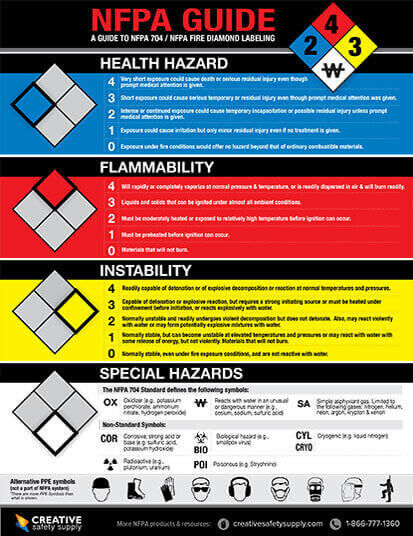
The National Fire Protection Association, or NFPA, is best known for their labeling standards that are used to identify potential hazards of various materials. They are often seen on the backs of trucks that are transporting these types of materials. The labels are shaped like diamonds and have numbers in them to indicate what type of hazard is present. Understanding when NFPA labels are required is essential for the safety of any facility.
What is the NFPA?
The NFPA is not a governmental organization and does not have any regulatory authority in the United States or other countries. Because of this, they cannot legally obligate any company to follow their standards. For the most part, companies choose to follow the NFPA labeling standards because they are proven to be effective and helpful in keeping people, equipment, and facilities safe. While the NFPA itself doesn’t have enforcement authority, there are times when companies have to follow the labeling standards that they wrote.
Adoption of NFPA Standards
Government agencies often look to private organizations like the NFPA when creating their safety standards and regulations. This is done because it is well-known that an organization like the NFPA has a proven track record of successfully creating effective safety practices. In addition, when a governmental agency simply adopts an existing standard, it is easier for companies to follow with minimal cost or disruption. In the end, this helps to improve safety, which is the goal of these agencies.
OSHA and NFPA
OSHA has adopted the labeling standards from the NFPA when it comes to identifying hazardous materials. They require that companies use this labeling system whenever hazardous materials are being transported, stored, or used in a facility. As the NFPA releases updates and improvements to their standards, OSHA will typically follow suit to remain in line with the latest and most effective safety standards.
So, while the NFPA can’t make it so their labeling system must be followed, that is the case in the real world thanks to regulations from OSHA and other governmental agencies. Any company owner or safety manager will want to make sure to keep up with the latest updates from the NFPA so they can avoid future compliance issues.
Similar Questions
- When are NFPA diamonds required?
- Who enforces NFPA standards?
- Are NFPA standards law?
- Are NFPA labels required by OSHA?
- Are NFPA codes retroactive?
- What is the NFPA diamond?
- Are NFPA and ISO standards the same?
- What does the NFPA regulate?
- Where should NFPA diamonds and labels be?

